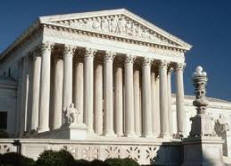 The Washington Redskins NFL team has been fighting for years to maintain its registered trademarks containing the term REDSKINS. Its on and off again fight has been hotly debated in public, press and the courts. Finally, the United States Supreme Court has weighed in. Funny enough, the case before them was not that of the Redskins but that of an obscure West Coast band, the Slants. Its front-man, Simon Tao, filed a trademark application for SLANTS, which was rejected by the United States Patent and Trademark Office (PTO) because it was derogatory to persons of Asian descent. We won’t keep you in suspense. The Supreme Court rejected the PTO position and held that the anti-disparagement clause of the Lanham Act, section 2(a), was an unconstitutional abridgment of freedom of speech. Simon Tao won!
The Washington Redskins NFL team has been fighting for years to maintain its registered trademarks containing the term REDSKINS. Its on and off again fight has been hotly debated in public, press and the courts. Finally, the United States Supreme Court has weighed in. Funny enough, the case before them was not that of the Redskins but that of an obscure West Coast band, the Slants. Its front-man, Simon Tao, filed a trademark application for SLANTS, which was rejected by the United States Patent and Trademark Office (PTO) because it was derogatory to persons of Asian descent. We won’t keep you in suspense. The Supreme Court rejected the PTO position and held that the anti-disparagement clause of the Lanham Act, section 2(a), was an unconstitutional abridgment of freedom of speech. Simon Tao won!So how did we get here? Our readers may recall that approximately three years ago the Trademark Trial and Appeal Board (“TTAB”) cancelled the Redskins trademark because it was disparaging to Native Americans. The question we posed in a short article was whether the Redskins could continue using its trademark despite cancellation of its trademark registration.
Since then a lot has happened. The Redskins filed an appeal to the United States District Court In Alexandria, Virginia. In July 2015, the district court affirmed the TTAB. The Redskins then filed an appeal to the United States Court Of Appeals For the Fourth Circuit. That court stayed the action because Simon Tam’s lawsuit, Lee v. Tam, was pending before the U.S. Supreme Court.
Back to the Supreme Court’s opinion in Tam. Justice Alito, delivering the Opinion of the Court, wrote unambiguously that section 2(a) of the Lanham Act violates the free speech clause of the First Amendment: “It offends a bedrock First Amendment principle: Speech may not be banned on the grounds that it expresses ideas that offend.”
The court rejected the argument that trademark registration is equivalent to “government speech,” which is typically denied First Amendment protections. The Court wrote
it is far-fetched to suggest that the content of the registered mark is government speech. If the federal registration for trademark makes the mark government speech, the Federal Government is babbling prodigiously and incoherently. It is saying many unseemly things…. It is expressing contradictory views. It is unashamedly endorsing a vast array of commercial products and services. And it is providing Delphic advice to the consuming public.
Likewise the Court rejected the government’s argument that trademark registration is a form of “subsidized” speech. That argument basically says that the government is not required to subsidize speech that it does not wish to promote. Acknowledging that this area of the law is tricky, Justice Alito concluded that there was no legal basis or precedent for concluding that trademark registration was a form of subsidized speech.
Lastly, Justice Alito reasoned that Section 2(a) could not pass muster even under the relaxed standard for commercial speech. That standard requires restrictions on commercial speech to serve a “substantial [government] interest” and be “narrowly drawn.” According to the Court,
The [disparagement] clause reaches any trademark that disparages any person, group, or institution. It applies to trademarks like the following: “Down with racists,” “Down with sexists,” “Down with homophobes.” It is not an anti-discrimination clause; it is a happy talk clause. In this way, it goes much further than is necessary to serve the interests asserted [emphasis in original].
Undoubtedly, the Redskins now have a firm basis in which to reinstate their registered trademarks.
What does this mean for trademarks that are not disparaging but “scandalous” under section 2 (a), the so-called “scandalous provision”? In a recent “Alert” the PTO acknowledged that under Tam, disparagement is no longer a valid ground for refusal or cancellation of a trademark registration but the scandalous provision – a different kettle of fish – while not subject to the Supreme Court’s decision, is presently pending before the Federal Circuit court in another case, In re Brunetti. Let’s see what happens.
Adam G. Garson, Esq.

